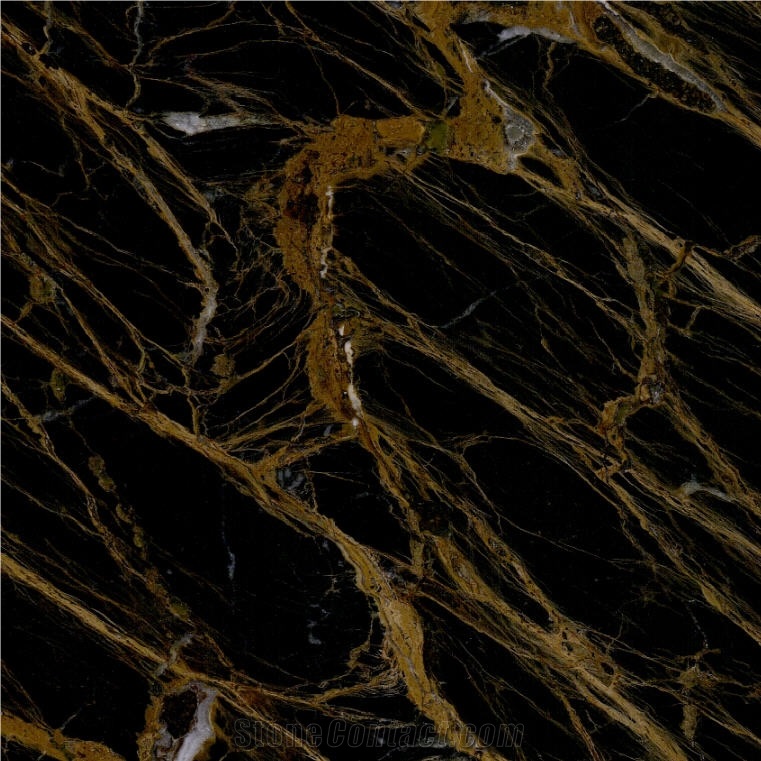Black Empire Marble
 Iran
Iran
Black Empire Marble is a kind of black marble quarried in Iran. This stone is especially good for Counter tops and bars, Interior wall panels, Water walls and fountains, mosiac, stairs, pattern and other design projects. It also called Iran Portoro Marble,Persian Nero Portoro,Persian Black Gold Marble,Black Empire Gold Marble,Empire Black Marble,Iran Nero Portoro Marble, in China stone market:铜雀台(Tóng què tái) . Black Empire Marble can be processed into Polished, Sawn Cut, Sanded, Rockfaced, Sandblasted, Tumbled and so on.

Does Black Empire Marble countertop scratch easily?

Does Black Empire Marble countertop stain easily?

Is Black Empire Marble a good countertop?

How do I protect Black Empire Marble kitchen countertop?

Does lemon juice stain Black Empire Marble countertop?

Does Black Empire Marble absorb heat?

Can Iran's Black Empire Marble be used exterior applications in very rainy climates?

Can Iran's Black Empire Marble be used in a office?

Is Iran's Black Empire Marble an expensive stone?

What grade is Iran's Black Empire Marble?

Can Black Empire Marble terrace be waterproofed?

Can I seal Black Empire Marble countertop myself?

What can I use to clean Black Empire Marble countertop?

What is the coefficient of friction of Water Jet Cut Iran's Black Empire Marble tiles?

Can I drill Black Empire Marble countertop myself?

How do I know if my Black Empire Marble is sealed?

What happens if I don't seal Black Empire Marble countertop?

How do I waterproof Black Empire Marble floor?

How thick is Iran's Black Empire Marble slabs?

Is Black Empire Marble good for bathroom?

Is Black Empire Marble floor hard to maintain?

What makes Black Empire Marble sparkle?

Does water stain on Black Empire Marble countertop?

Are there color variations of Iran's Black Empire Marble?

Does Black Empire Marble floor need to be sealed?

Does olive oil stain Black Empire Marble?

Can Iran's Black Empire Marble be used in floor coverings?

Does sealing Black Empire Marble make it shiny?

Does baking soda whiten Black Empire Marble?
-

Xiamen Dingjun Trading CO., LTD
 China
China
 6YRDiamond members are premium members on platform, providing members with comprehensive approach to promoting their products, increasing products exposure and investment return to maximize.
6YRDiamond members are premium members on platform, providing members with comprehensive approach to promoting their products, increasing products exposure and investment return to maximize.
 Verified Supplier is for prove company authenticity,including business license,trade license and effective office space,to enhance buyers' trust to suppliers and their products, reducing communication costs.
Verified Supplier is for prove company authenticity,including business license,trade license and effective office space,to enhance buyers' trust to suppliers and their products, reducing communication costs.
Contact Supplier
-

-

Xiamen StoneMarkt Company Limited
 China
China
 Verified Supplier is for prove company authenticity,including business license,trade license and effective office space,to enhance buyers' trust to suppliers and their products, reducing communication costs.
Verified Supplier is for prove company authenticity,including business license,trade license and effective office space,to enhance buyers' trust to suppliers and their products, reducing communication costs.
Contact Supplier
-

-

-

 Turkey
Turkey
 Verified Supplier is for prove company authenticity,including business license,trade license and effective office space,to enhance buyers' trust to suppliers and their products, reducing communication costs.
Verified Supplier is for prove company authenticity,including business license,trade license and effective office space,to enhance buyers' trust to suppliers and their products, reducing communication costs.
Contact Supplier
-

 Turkey
Turkey
 Verified Supplier is for prove company authenticity,including business license,trade license and effective office space,to enhance buyers' trust to suppliers and their products, reducing communication costs.
Verified Supplier is for prove company authenticity,including business license,trade license and effective office space,to enhance buyers' trust to suppliers and their products, reducing communication costs.
Contact Supplier
-

 China
China
 12YRDiamond members are premium members on platform, providing members with comprehensive approach to promoting their products, increasing products exposure and investment return to maximize.
12YRDiamond members are premium members on platform, providing members with comprehensive approach to promoting their products, increasing products exposure and investment return to maximize.
 Verified Supplier is for prove company authenticity,including business license,trade license and effective office space,to enhance buyers' trust to suppliers and their products, reducing communication costs.
Verified Supplier is for prove company authenticity,including business license,trade license and effective office space,to enhance buyers' trust to suppliers and their products, reducing communication costs.
Contact Supplier
-

-

Xiamen Dingjun Trading CO., LTD
 China
China
 6YRDiamond members are premium members on platform, providing members with comprehensive approach to promoting their products, increasing products exposure and investment return to maximize.
6YRDiamond members are premium members on platform, providing members with comprehensive approach to promoting their products, increasing products exposure and investment return to maximize.
 Verified Supplier is for prove company authenticity,including business license,trade license and effective office space,to enhance buyers' trust to suppliers and their products, reducing communication costs.
Verified Supplier is for prove company authenticity,including business license,trade license and effective office space,to enhance buyers' trust to suppliers and their products, reducing communication costs.
Contact Supplier
The request includes: 1. surface finished, size 2. quantity required






